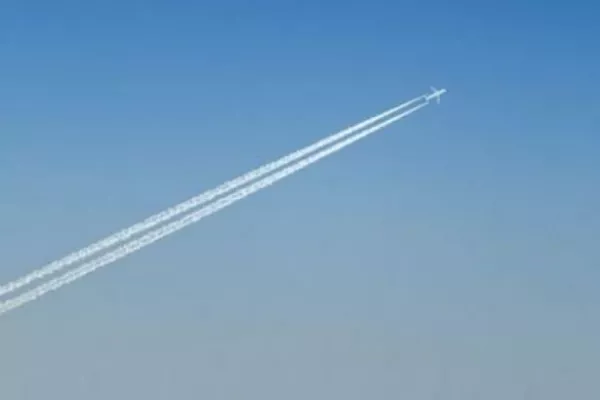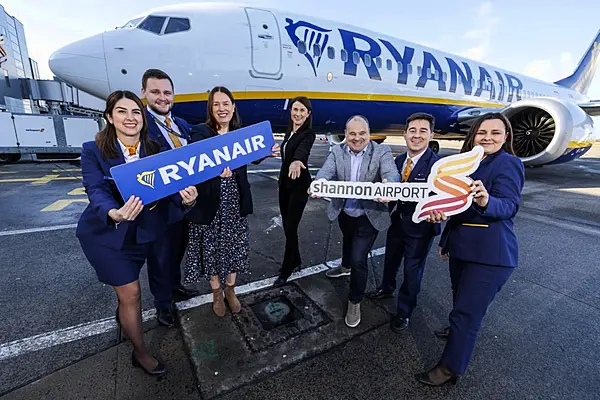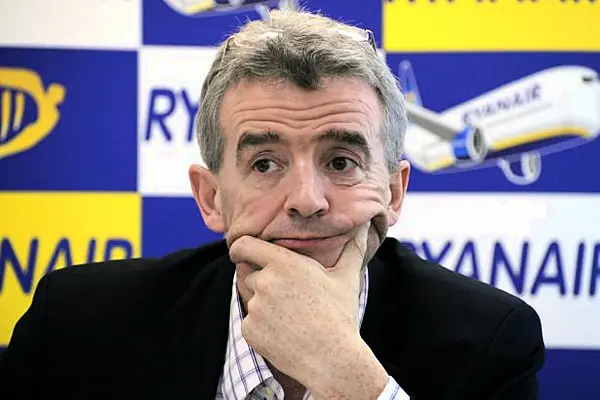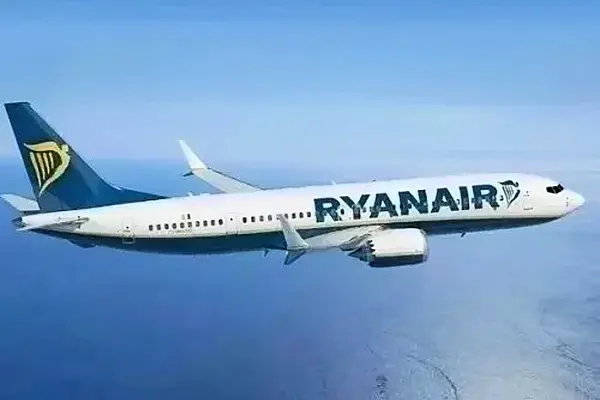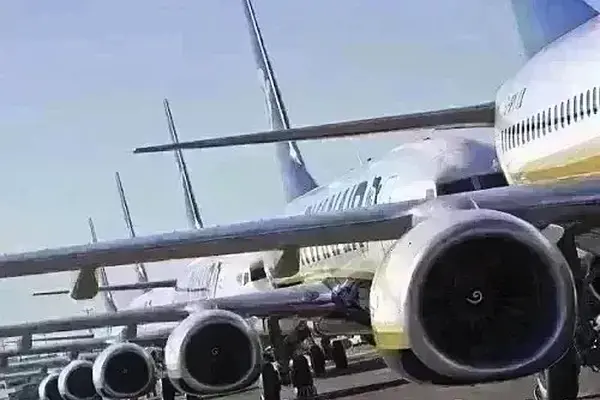Hospitality Ireland presents a round-up of the latest airline and aviation news from around the world.
Leasing Firms Buy More Planes Than Ailing Airlines For First Time
Aircraft leasing companies are for the first time buying more of the world's passenger planes than airlines after the COVID-19 pandemic clobbered carriers around the world, senior industry executives said on Monday September 20.
The historic shift, following decades of gradual growth, is down to leasing giants being able to access cheaper financing than carriers in another sign of the financial woes facing much of the airline industry, they said.
Aircraft lessors, who buy planes from manufacturers like Airbus SE and Boeing Co and lease them on to airlines, had accounted for around 40-45% of aircraft deliveries before the pandemic, said industry pioneer Steven Udvar-Hazy.
"Leased content has grown to around 60% of deliveries," Udvar-Hazy, executive chairman of lessor Air Lease Corp, told the Airline Economics conference in London.
Udvar-Hazy, who said he remembered the sector providing finance for just 1% of deliveries when he helped pioneer the industry in the early 1970s, said it was hard to say if the number could go higher.
"It's in a range now that is probably a good equilibrium for the industry," he told Reuters. "I never thought it would get to 50% or even 40%."
As the industry recovers, airlines may recover the ability to get the financing on their own, he added.
A senior executive for larger rival AerCap agreed that the leasing sector was now responsible for financing a majority of new passenger jet deliveries, financing somewhere between 50% and 60%.
"Going into COVID, we were always 'will we ever get to 50%?' and we've blown through that," AerCap Chief Commercial Officer Peter Anderson told Reuters, adding he thought the new level was sustainable.
Udvar-Hazy said the 60% number included sale-and-leasebacks, finance leases and operating leases.
He said the industry's manufacturing duopoly of Airbus and Boeing were comfortable with the shift in power from the airlines to the leasing companies.
"It's much better for Airbus to have a financially capable buyer," he said. "The leasing industry has the capital to show up at delivery and actually take delivery."
Some lessors are paying under 2% for finance compared with over 4% for some of the largest airlines in the United States and Europe, Udvar-Hazy told the conference, the first major gathering of leasing sector since the pandemic hit.
Iberia To Negotiate Furlough With Unions If Spain Ends COVID-19 Force Majeure
Spanish airline Iberia will seek to negotiate furlough deals directly with unions should Spain's force majeure government furlough scheme, set to expire at the end of September, not be extended for the aviation sector, the company said on Monday September 20.
The airline, which is owned by IAG and recently bought struggling Spanish rival Air Europa in a cut-price deal, said that it would propose a furlough to workers citing "organisational and productive causes".
It did not give further details of what any possible deal could entail.
"The slowdown of the economic recovery and the growing uncertainty as to whether, and under which conditions, the force majeure furloughs will apply to the aerial sector have spurred Iberia to begin negotiations with its labour unions," the company said in a statement.
The airline added that it continued to operate 30%-35% below pre-pandemic levels, largely due to the restrictions on tourism towards the United States, Latin America, Japan and China.
Air travel to Spain has slowly begun to recover in recent months with five million international passengers arriving in August, according to official data released on Monday September 20, soaring by 172% from a year ago, but less than half pre-pandemic levels.
AerCap Expects Further Consolidation In Air Leasing Sector
AerCap expects further consolidation in the global aircraft leasing sector after its takeover of General Electric's leasing business, a senior executive said on Monday September 20.
The combination of the world's two largest aircraft leasing companies, which will rank as the largest buyer of airliners built by Airbus and Boeing, is due to be completed by the end of the year.
Asked if he expected further consolidation in the industry, which helps finance $150 billion of aircraft every year, Chief Commercial Officer Peter Anderson said, "I do...and frankly it would be welcome. There is enough room in this industry for several large players."
"We welcome some discipline, rational competition in the market," he added, speaking to the Airline Economics conference in London. "There are some great platforms out there. Who buys who is a completely different question which I don't know the answer to."
The aircraft leasing sector finances 50%-60% of all new passenger aircraft deliveries, its highest ever level, Anderson said.
He said that Airbus and Boeing may become more cautious about how many planes they sell to smaller players since some lessors delayed deliveries during the COVID-19 crisis.
They "are going to be a little more conservative with the lessors in terms of who they sell to and how big they sell," Anderson said.
AerCap is facing a mixed recovery in the airline sector, Anderson said.
"It's not a constant recovery. It's going to be rocky for a while," he said, pointing to Southeast Asia as a laggard.
But he said a strengthening of the sector meant that the "window was closing" for airlines to get the kind of concessions that were offered in recent months to help struggling carriers stay afloat.
There is not likely to be any lasting impact in lease rates due to COVID-19, he said.
Easing Restrictions Will Boost US Airlines But Business Travel Still Unclear
US airlines will benefit from the Biden administration's decision to reopen the country to fully-vaccinated air travellers from around the world, experts have said, but the outlook for lucrative business travel was less certain.
Lifting restrictions will allow tens of thousands of foreign nationals to fly to the United States. It also gives the big three air carriers, American Airlines, United Airlines and Delta Air Lines, a chance to recover part of their trans-Atlantic business.
Moody's Investors Service estimates the White House decision would result in a "stronger" operating cash flow at US airlines in the next six months.
Trans-Atlantic flights accounted for 11% to 17% of their 2019 passenger revenues. Overall, international travel generated 26% to 38% of revenue for the three airlines in 2019, said Colin Scarola, vice president equity research at CFRA Research.
Scarola added that "the international category has been the one that really hasn't recovered much at all."
The lifting of restrictions coincides with the onset of winter season, historically a lean period for international travel. Scarola said the decision would encourage companies to approve overseas business trips, yet the fight against COVID-19 was more important and he does not expect international travel to rebound to pre-pandemic level before late 2022.
CEO Doug Parker said American Airlines was "looking forward to welcoming more customers back to easy, seamless international trips for business, for leisure, and to reconnect with family and friends."
In early September, US airline passenger volumes for international travel were just 44% of the pre-pandemic levels, according to data from Airlines for America, an industry trade group.
Savanthi Syth, an analyst at Raymond James, called the White House's decision an "incremental positive" that would give U.S. carriers clarity for next year's summer travel season. Yet it did not prompt her to revise her financial estimates for them or the outlook for air-travel.
"While this is a net positive, you have to kind of counterbalance it with what's happening in the US," she said, referring to warnings from airlines this month about the financial hit from the fast-spreading Delta variant of the coronavirus.
Several airlines have slashed revenue forecasts, citing a slowdown in bookings and increased cancellations. The resurgence in cases has also stalled a pickup in business travel, a cash cow for airlines with a roundtrip business class ticket for a Chicago-New York United flight nearly triple the price of economy class.
Syth expects domestic business travel to remain below the 2019 levels at least until late 2022. International business travel is not expected to recover before 2024, she said.
Bamboo Airways To Sign Deal With GE For Engines On Boeing Jets
Vietnam's Bamboo Airways will sign a deal valued at nearly $2 billion with General Electric to purchase GEnx engines to power Boeing 787-9 Dreamliner aircraft, the airline said on Tuesday September 21.
The deal would be signed in the United States later on Tuesday in the presence of Vietnam President Nguyen Xuan Phuc, Bamboo said in a statement.
The GEnx engines, due to be delivered in 2022, will be used on the airline's wide-body Dreamliner fleet to operate planned non-stop routes between Vietnam and the United States, the company said.
"This new signing agreement will be an important milestone for the airline to expand its transcontinental flight network, connecting Vietnam with medium- and long-range markets," the statement said.
The airline said it will open a representative office in the United States and sign agreements with San Francisco International Airport and Los Angeles International Airport this week, paving the way for its first test of a non-stop flight between the countries on Thursday.
Bamboo said it aims to finalise procedures for non-stop commercial flights to the United Sates early next year, pending government approvals.
Bamboo said that it is also seeking to expand its international flight network and open more routes to Australia, the United Kingdom and Germany, using its Boeing 787-9 Dreamliner aircraft.
Easyjet CEO Tells Ryanair Boss To Focus On Running His Own Airline
The head of budget airline easyJet has told the boss of Ryanair to focus on running his own airline after he questioned the British carrier's independence.
Ryanair group chief executive Michael O'Leary was quoted as telling The Financial Times last week that rivals easyJet and Wizz Air would need to merge or be taken over as the industry consolidates in the wake of the COVID-19 pandemic.
"[It is] complete nonsense," easyJet CEO Johan Lundgren told Reuters in an interview. "I would urge anyone who runs an airline to focus on their own business rather than speculate about others, [where] they have no idea about what's going on."
Lundgren said consolidation was already taking place in Europe as weaker airlines cancel capacity, and that easyJet was not opposed in principle to consolidation carried out in the form of external transactions.
"We are not against any M&A type of activity but it needs to be able to deliver value for shareholders and to deliver a reason to believe in a successful outcome," he said.
Asked whether easyJet saw itself as a buyer in any future shake-out of the European airline industry, Lundgren said, "We would be looking at companies, as I am sure companies would be looking at us. There is no drama around that at all."
Tensions had flared days after easyJet said it had rejected a takeover approach from Wizz Air that would have created a low-cost airline to rival Ryanair, opting instead to raise $1.7 billion from shareholders.
Lundgren said the rights issue was attracting broad investor support, but acknowledged some discussions about the timing.
"As with anything, we are having discussions about the size and the timing, but also the need we have to make sure we are right-funded to make sure we can invest in growth when those opportunities come," he said. "Most people completely understand the reason for that and [that] it is the right thing to do and the right time to do this."
As America Reopens, Airlines Hunger To Reclaim Transatlantic Cash
America's reopening to international air travellers cannot come soon enough for US and European airlines which have sorely missed the lucrative transatlantic market.
The Biden administration's decision to reopen the country to fully-vaccinated air travelers from around the world will allow tens of thousands of passengers to fly to the United States from early November.
For the large traditional European airline players, like British Airways-owner International Airlines Group (IAG), Lufthansa and Air France-KLM, it represents a chance to recover the transatlantic routes that are key to their profits.
US carriers, American Airlines, United Airlines and Delta Air Lines, will also benefit, although their finances had already been helped by a recovery in the large US domestic market to near pre-pandemic levels.
"The transatlantic market is a key profit generator for the main European legacy airline groups," said Bernstein analyst Daniel Roeska.
Pre-pandemic, in 2019, those routes accounted for more than 26% of IAG's revenues, Roeska estimates, over 24% of Lufthansa's and over 16% of Air France-KLM's. Transatlantic flights accounted for between 11% and 17% of US airlines passenger revenues that year.
Shares in IAG rose 4% on Tuesday September 21, having jumped 11% on Monday when the White House announced the reopening. Air France was up 3% on Tuesday.
The news will also benefit British-based airline Virgin Atlantic, a transatlantic specialist, which has turned to cargo to help it survive the pandemic.
The lifting of restrictions coincides with the onset of winter season, historically a lean period for international travel, when many airlines tend to make a loss.
Colin Scarola, vice president equity research at CFRA Research, said the decision would encourage companies to approve overseas business trips, yet COVID-19 risks remain, and he does not expect international travel to rebound to pre-pandemic levels before late 2022.
British Airways said that its customers were keen to fly again, citing an increase of nearly 700% in searches for holidays to U.S. destinations like New York, Orlando, Las Vegas and Miami on its website on Monday September 20, versus the same day last week.
In the United States, though, airlines fear the travel recovery could by blunted by the Delta variant of the coronavirus.
While Europe has been contending with the fast-spreading variant for months, it hit the United States later and carriers there have warned this month about the consequent financial hit.
Several airlines have slashed revenue forecasts, citing a slowdown in bookings and increased cancellations.
Savanthi Syth, an analyst at Raymond James, called the White House's decision an "incremental positive" that would give US carriers clarity for next year's summer travel season. Yet it did not prompt her to revise her financial estimates for them or the outlook for air-travel.
In early September, US airline passenger volumes for international travel were just 44% of the pre-pandemic levels, according to data from trade body Airlines for America.
Gol Hails Deal To Bring Flying Taxis To São Paulo
A fleet of electric air taxis is set to take off over São Paulo by 2025 after a deal between Brazilian airline Gol Linhas Aereas Inteligentes and Irish lessor Avolon to buy or lease 250 of the aircraft.
Gol said on Tuesday September 21 that the VA-X4 eVTOL, manufactured by Britain's Vertical Aerospace, would boost its domestic regional offering and help it reach its 2050 carbon neutrality goal, lifting its shares in São Paulo.
"The VA-X4 is ideal for a city like São Paulo," Vertical Aerospace CEO Stephen Fitzpatrick said in a statement. "Our eVTOLs will transform how we travel around high population density cities that are clogged with traffic."
Avolon, which has agreed to buy up to 500 of the aircraft from the British manufacturer, said it was close to reaching agreement with Asian operators for the remaining 250 jets, with deals expected within 6-12 months.
"I would fully expect us to have placed all of our initial 500 order in that time frame," Avolon Chief Commercial Officer Paul Geaney told Reuters. "We'll be looking to Asia after São Paulo."
Gol said the move is part of its commercial strategy to invest in regional air transportation. The airline intends to open up new routes to "underserved domestic markets".
Preferred shares in Gol were up 3.3% at 1500 GMT on Tuesday September 21 to 19.48 reais, while the broader Bovespa index rose around 0.8%.
Gol said in a securities filing that a holding company owned by Gol's controlling shareholders, Grupo Comporte, will finance the transaction, without giving a figure.
The first step of the new partnership is to carry out a feasibility study, including aircraft certification and analysis of the infrastructure needed, Gol said.
Avolon, which has said that it believes that flying taxis could rapidly poach passengers from planes, expects to complete the VA-X4 certification process in Brazil by 2024.
Vertical Aerospace is backed by American Airlines, which has recently announced an exclusive three-year codeshare and $200 million equity investment in Gol.
Takatso Says It Is Still In Talks Over South African Airways Investment
Takatso Consortium said on Wednesday September 22 that it was still in discussions with South Africa's Treasury over its purchase of a 51% stake in the country's struggling national airline but said both parties were committed to an agreement.
The transaction was large and complex and so might take time to finalise, it said in an e-mailed statement, although it said a due diligence process was largely complete and had identified no material issues.
US Sues To Stop American Airlines-JetBlue Partnership
The US Justice Department and six states filed an antitrust lawsuit on Tuesday September 21 against American Airlines Group Inc and JetBlue Airways Corp seeking to stop a partnership the government said could lead to higher fares in busy Northeastern US airports.
The lawsuit asked a federal court in Boston to stop the "Northeast Alliance" partnership, announced in July 2020 and approved by the US Transportation Department shortly before the end of the Trump administration. It took aim at American Airlines, the largest airline in the world, saying the alliance would cost consumers hundreds of millions of dollars.
"Fewer flights. More expensive tickets. Lower quality service," said California Attorney General Rob Bonta whose state was one of those that joined in the suit. "Plain and simple: American Airlines and JetBlue's Northeast Alliance is anticompetitive."
Shares of both airlines closed lower and both vowed to fight the suit, which struck a serious blow to a deal that could help both companies profit at a time when the pandemic has sunk sales and the outlook for air travel remains murky.
JetBlue CEO Robin Hayes maintained the alliance has actually led to lower fares for the northeastern United States and said the airlines compete vigorously elsewhere.
"DOJ presided over an unprecedented amount of consolidation to create four large airlines," Hayes said, noting that blowing up the alliance would mean JetBlue loses access to slots held by American. If the government wins, "JetBlue is the biggest loser there and they are returning all of those slots and all of that power back to [American]."
The suit also signals the Biden administration's interest in trying to inject more competition where American and three other airlines control 80% of the domestic air market.
The Justice Department said that the sweeping alliance would create a de facto merger in the northeast and combine the two carriers operations at four major airports: Boston Logan, John F. Kennedy, LaGuardia and Newark Liberty.
The agreement allows American and JetBlue to sell each other's flights in their New York-area and Boston networks and link frequent flyer programs in a move aimed at giving them more muscle to compete with United Airlines and Delta Air Lines in the Northeast.
Shares of American Airlines closed down 2.8% at $19.76 on Tuesday September 21 while JetBlue was down 4.8% at $14.76.
States joining the lawsuit include Arizona, California, the District of Columbia, Florida, Massachusetts, Pennsylvania and Virginia, the court records show.
The Justice Department complaint said the partnership at least partially removed JetBlue as a disruptive maverick that would work to drive down prices.
"JetBlue’s reputation for lowering fares is so well known in the airline industry that it has earned a name: the 'JetBlue Effect'," it said.
Elsewhere, the government said American was "not satisfied with the consolidation that has made it the largest airline in the world" and was trying "to co-opt JetBlue."
The complaint said American chief executive Doug Parker "has cheered...successive waves of industry consolidation. When he was not cheering them, he led them. He served as CEO of America West when it merged with US Airways. Later, he served as CEO of US Airways when it merged with American. Internally, American has referred to Mr. Parker as the 'Godfather of consolidation.'"
Parker said in a statement the lawsuit "seeks to take away consumer choice and inhibit competition, not encourage it. This is not a merger: American and JetBlue are - and will remain - independent airlines."
The Wall Street Journal reported earlier on Tuesday September 22, citing people familiar with the matter, that The US Justice Department was preparing to file a lawsuit challenging American Airlines Group Inc's partnership with JetBlue Airways Corp on antitrust grounds.
Airbus In Talks On Sales Of A350 Freighter, Says Sales Chief
Airbus is in talks with several potential customers for a new A350 freighter while seeing signs of demand for smaller A320 passenger jets in Europe, its sales chief said on Tuesday September 21.
With e-commerce booming, Airbus formally began marketing a proposed freight variant of its A350 passenger jet in July, taking aim at Boeing’s tight grip on the global cargo market.
“We are in a number of very encouraging discussions,” Chief Commercial Officer Christian Scherer told reporters in Toulouse, where the European planemaker is based.
“It is available for sale and is selling,” he added.
Boeing has for years dominated the market for purpose-built freighters, even as its European rival grabbed the crown as the world's largest maker of passenger jets.
Boeing is preparing to launch its own new freighter, a cargo version of its upcoming 777X jetliner, industry sources say.
Freighters can sell for higher prices than passenger planes and help to prop up depressed production for wide-body models at a time when long-haul travel is weak, industry experts say.
While demand for wide-body passenger jets remains stagnant, demand for smaller planes used in regional and domestic markets is rising.
"Demand is coming back," Scherer said. "We need to be very careful - we are not out of the woods and we are still in a very fragile environment - but Europe is rallying quite nicely at this moment."
Airbus plans to increase production of the medium-haul A320neo family, which competes with Boeing's 737 MAX, to a record 63 a month from 40 now, surpassing pre-crisis levels.
It has said it is also looking at pushing output as high as 75 a month, but such levels have drawn concerns about supply chains from engine makers like France's Safran.
Scherer defended the existing production commitments, which he said were justified by contracts with airlines even after an industry shakeout brought about by the coronavirusus crisis.
"If anything in my world I am challenging them to be steeper," he said.
Airbus is talking to Hungary's Wizz Air over a sale of at least 100 more narrowbody jets, Reuters reported earlier this month.
Among other European prospects, British Airways parent IAG has reopened a fresh competition between Airbus and Boeing for narrowbody jets, revisiting a large provisional order for 200 MAX jets that was never finalised, the sources said.
Finnair is looking at a narrowbody purchase but a formal tender has yet to be launched.
Air France-KLM said in July that it had launched a tender to extend the medium-haul fleets of Dutch unit KLM and the French and Dutch arms of low-cost subsidiary Transavia.
News by Reuters, edited by Hospitality Ireland. Click subscribe to sign up for the Hospitality Ireland print edition.
